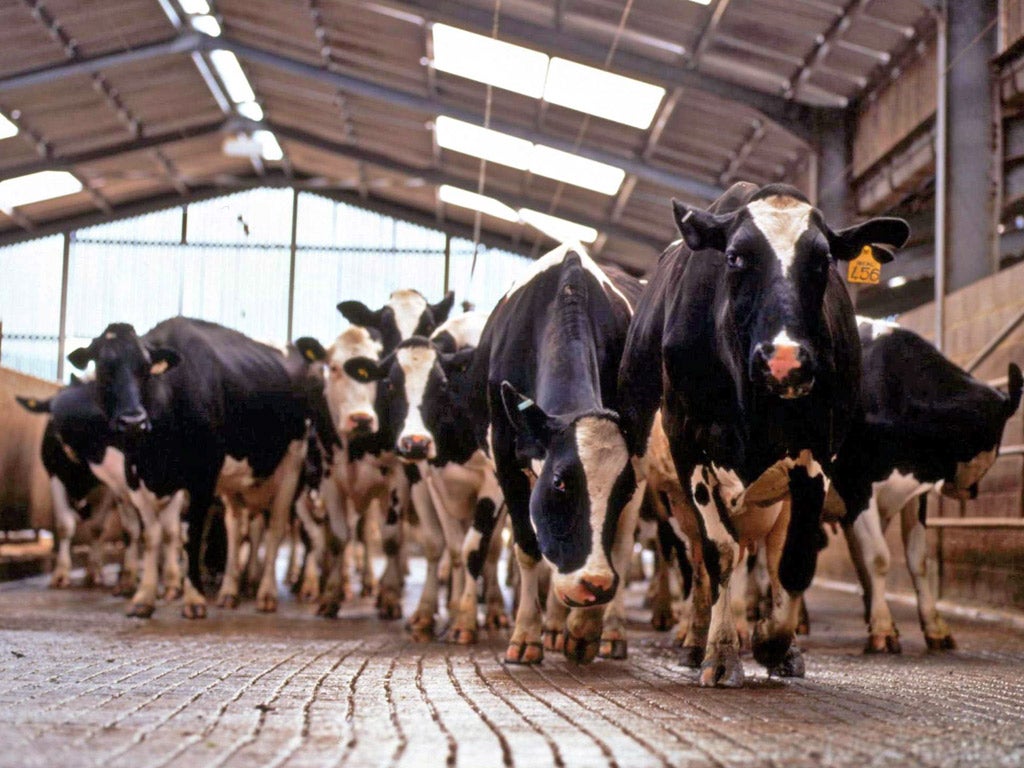Milk crisis turns sour as dairy farmers reveal plans to blockade supermarkets
Milk producers say they face bankruptcy unless the 4p-a-litre cut is reversed

Dairy farmers are planning a series of demonstrations against supermarket chains in protest at lower milk prices that they say will bankrupt them and change the countryside.
Blockades of stores and restricting supply by pouring milk down the drain are among the measures being considered against Asda, Co-Op and Morrisons, unless the farmers' demands are met – a reversal of the 4p-a-litre cut in the next fortnight.
The grocers pay around 27p a litre for milk, below the 30p cost of production estimated by the National Farmers Union (NFU). Marks & Spencer and Waitrose pay 32p, Sainsbury's 30p and Tesco 29p.
The prospect of escalating action has raised the stakes of a dispute that saw more than 2,500 protesting dairy farmers descend on Westminster last week.
Since 2000 the number of dairy farmers has shrunk by 40 per cent to 10,700 and many of those were struggling before this summer's price reductions.
Britain's biggest fresh milk company, Robert Wiseman, is cutting the farmgate price by 1.7p a litre on 1 August, on top of a 2p cut in June. Dairy Crest, Arla and First Milk have made similar cuts.
The dairies say they have no option but to pass on steep falls in the global price of cream, caused by lower demand from China. Farmers say the root cause is that dairies have slashed their margins to the bone competing for supermarkets' contracts. After being targeted by farmers in Wales at the weekend, Morrisons announced a review of its pricing, while yesterday Asda increased its premium from 1p to 3p a litre, taking its price to around 27p.
The NFU is demanding a complete reversal of all this year's cuts. "They are unsustainable, dairy farmers won't be able to stay in business," Fran Barnes, NFU communications manager, said.
A further exodus could shift milk production from small family farms to mega dairies with thousands of cows grazed indoors.
The TV chef Hugh Fearnley-Whittingstall said: "What's at stake, ultimately, is the full intensification of the dairy industry, into an indoor industrial process like broiler farming or factory-pig production. So what's also at stake is a whole landscape and centuries-old rural infrastructure, millions of acres of pastures and hedgerows."
The British Retail Consortium Food said supermarkets paid more for milk than other customers.
Case study: 'We will run out of money by the end of the year'
With the price many of Britain's dairy farmers are getting for their milk set to fall again at the beginning of next month, it is threatening to kill businesses like Matt Baber's - not to mention a way of life.
Mr Baber's family has farmed on the land near the Severn estuary for generations. But this year's harsh summer, mixed with the newly imposed price reductions and rising costs means that, by his calculations, he will be losing around £200-a-day after the cut.
The 27-year-old said he will be able to sustain losses like that until the end of the year, but not beyond. The consequences, he said yesterday, would be two-fold: for him, it meant being forced to sell off land or cattle and, possibly, the whole farm.
"At the end of the year we run out of money. We will not be able to pay the bills. We can fund the farm until then out of our savings and we have crops in the fields. Once you start selling your cattle and land, it becomes even harder to make a living: it becomes a vicious cycle," he said.
The price farmers like Mr Baber – who is not tied to a supermarket – are given is dictated by the processing firms, which sell it on to the supermarkets. And he was pessimistic about their chances of forcing the retailers' arms.
He said: "We have very little power. My 1.6 million litres-a-year is a drop in the ocean to the supermarkets. I am like a mosquito to them.
"There are very few dairy farmers around here now, everyone was milking not too long ago. But the low prices have gradually put them off. Now, there is only one dairy farm left in the immediate vicinity and only another two within a stone's throw."
Mr Baber, who has an average-sized herd, milking 120 cows, predicted that could eventually mean larger and larger landholders taking over what production is left in Britain. "You might start to get corporate entities running herds of at least 500 cows and no one else is able to survive," he said.
Mr Baber lost his right leg below the knee in a farming accident in March and, in January last year, his father died, he believes as a result of the stress involved in farming. He said that injuries and deaths are becoming more common because farmers can no longer afford to employ enough staff.
Looking towards the sky, he said he was just hoping for some good weather soon so that he could harvest the crops he needs. He added that, when confronted, the supermarkets immediately point out that they are looking after their "golden ticket" farmers – those with whom they deal directly. "All we want is a system where people understand that farms are dependent on things like the weather; one where people look out the window and realise that conditions are tough but they rely on us.
He added: "No farmer wants to see the consumer have to put their hand in their pocket for more: they are suffering too. But the supermarket controls the price, there is no accountability."
Subscribe to Independent Premium to bookmark this article
Want to bookmark your favourite articles and stories to read or reference later? Start your Independent Premium subscription today.

Join our commenting forum
Join thought-provoking conversations, follow other Independent readers and see their replies